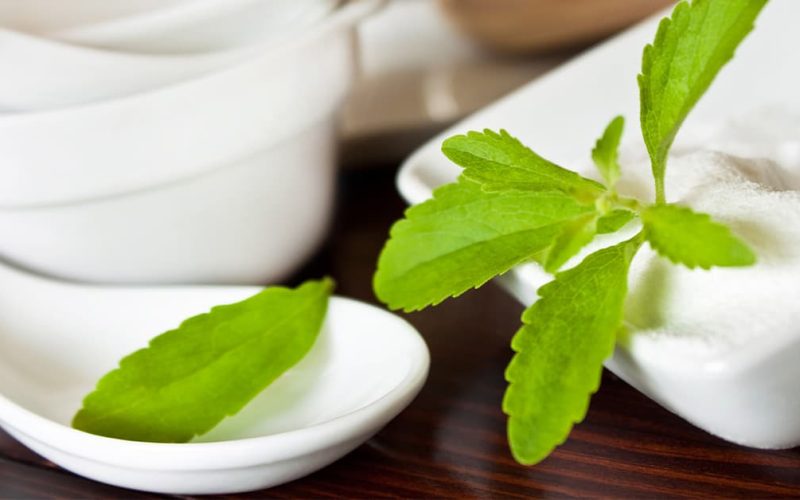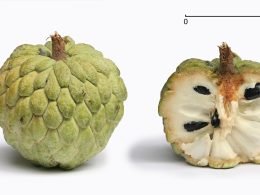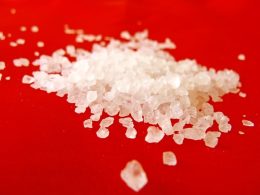The stevia plant is a bushy shrub that belongs to the Asteraceae family alongside ragweed and daisy. It is widely grown in many countries, especially China and Japan, though it is native to Brazil and Paraguay.
Stevia has been used as a natural food sweetener for decades and was a crucial ingredient in traditional medicine in its native regions.
It was used to treat burns, stomach problems, colic, and sometimes as a contraceptive. People also chewed the leaf raw as a sweet treat.
There are over 150 species of the sweet leaf in North and South America; however, stevia rebaudiana is the sweetest and most grown among all.
In recent times, it’s refined products have been used as a natural substitute for sugar. This owes to the fact that Stevia is 200 or 300 times sweeter than table sugar plus, it contains zero calories with no impact on blood glucose levels.
What are the health benefits of Stevia?
Stevia is a natural substitute for sucrose; therefore, it has the potential of supporting several health functions.
Since it contains little or zero amount of calories, it is particularly helpful for weight loss or diabetes control. Plus, the sweet-tasting components in the sweet leaf occurs naturally, making it a healthy option for people who like naturally-sourced food and beverages.
Here are some of the possible benefits linked to Stevia
Diabetes
Studies have revealed that stevia sweeteners add calories or carbohydrates to the diet. They also do not have any effect on insulin response or blood glucose. This enables people with diabetes to enjoy a wider variety of food and still stay true to their weight loss diet plans.
One study noted that Stevia significantly reduced blood glucose levels and glucagon response in people with diabetes after a meal.
Glucagon is a hormone that works to regulate the blood glucose levels, and the gland that produces glucagon is often faulty in diabetes patients.
Glucagon levels drop when blood glucose rises. This keeps the glucose level in check.
Weight control
Overweight and obesity have many causes. They include increased consumption of energy-dense food that are high in added sugars and fat and not little or no physical activities to burn calories.
Studies have shown that the consumption of added sugars makes up for 16% of the calories in an American diet. This has been linked to reduced control of blood glucose levels and weight gain.
Stevia is an excellent addition to meal plans that help reduce energy intake without sacrificing the meal taste since it contains zero sugar and little or no trace of calories.
Pancreatic cancer
Stevia is packed with many antioxidants and sterols compounds, including antioxidants, including kaempferol. Studies have pointed out that kaempferol can lower the risk of pancreatic cancer by up to 20 per cent.
Frequently asked questions about Stevia
Where can I buy Stevia?
Stevia is the universal name of all products made from the plant extract. It can be purchased from any grocery store around you. You can also buy it online. You’ll find the sweetener sold under trade names like SweetLeaf, Pyure, or Truvia.
When substituting sugar for Stevia, do I use the same quantity?
Since Stevia is estimated to be 200 to 300 times sweeter than table sugar, you won’t be using as much in your food and beverages.
The rate of conversion largely depends on the type and brand of Stevia you purchased. For every teaspoon of sugar, the stevia equivalent may be anywhere from 1/7th to 1/2 teaspoon of Stevia, depending on the method used in the sweetener’s production.
Is Stevia safe to bake with?
There are some stevia brands made, especially for baking.
Stevia Uses and Tips
If your goal is to reduce sugar intake, try using Stevia in your morning tea or coffee. Since it blends well, you can use it to make smoothies, oatmeal, and even to top your favourite cereal if you like an extra dose of sweetness.
You can also find a wide variety of online recipes to help you incorporate Stevia into other foods like baked goods (muffins, cookies, and bread), barbecue sauce, and sweet desserts such as chocolate mousse and Panna cotta.
Some people have noticed a difference in taste in some foods made with Stevia instead of sugar. So you may need to try out several products to know which one is good for you and your family.
What are the side effects and safety of Stevia?
The US Food and Drug Administration approved the use of Stevia as a food additive after several companies (including Coca-Cola, and PepsiCo) in 2008, conducted scientific reviews that deemed stevia extract to be GRAS or ‘generally regarded as safe.’
Before the approval, the FDA had banned the use of Stevia as an additive and was only marketed as a dietary supplement and was mainly sold as a liquid extract in natural food stores.
Some health experts had condemned the FDA’s move, citing a study revealing that stevia consumption may cause damage in the DNA of rats.
It is worthy to note that this study wasn’t based on the effects of rebaudioside A but of stevioside (another compound in Stevia). To date, there is no scientific proof to point out that rebaudioside A is harmful to human consumption.
According to the American Academy of Asthma, Allergy, and Immunology, there has been only one recorded case among numerous lay stories of allergic reactions caused by Stevia (and other sweeteners). It is LIKELY SAFE to ingest as a food sweetener.
It is recommended that you seek medical advice if you suspect an allergy to Stevia and other sweeteners.
References
- Stevia: health benefits, facts and safety – MedicalNewsDaily
- Effects of Stevia, aspartame, and sucrose on food intake, satiety, and postprandial glucose and insulin levels – ScienceDirect
- Sugar substitutes: Health controversy over perceived benefits – NCBI









